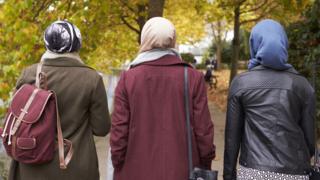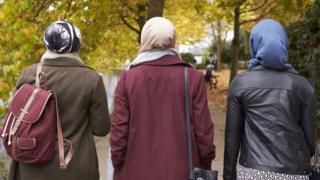Hate crimes recorded by police up 10%
A record number of offences were recorded in England and Wales for 2018-19, the Home Office says. …

 Image copyright Getty Images
Image copyright Getty Images There has been a 10% rise in hate crimes recorded by police in England and Wales.
There were 103,379 offences in 2018-19 – a record number – according to Home Office figures.
Transgender hate crime went up 37%, while for offences motivated by sexual orientation the rise was 25%, by disability 14% and by religion 3%.
Race hate crimes accounted for around three-quarters of offences (78,991) and rose by 11% on the previous year.
Over half (54%) of the hate crimes recorded by the police were for public order offences and a further third (36%) were for violence against the person offences.
Five per cent were recorded as criminal damage and arson offences.
- Homophobic abuse charges fall despite reports soar
- ‘Malicious disability comments part of daily life’
Hate crime is defined as an offence which the victim or any other person considers to be driven by hostility towards their race, religion, sexual orientation, disability or transgender identity.
It can include verbal abuse, intimidation, threats, harassment, assault and bullying, as well as damage to property.
The Home Office said the large percentage increases for transgender, disability and sexual orientation hate crimes were “partly due to the smaller number of these crimes”.
The department said increases may also be because of improvements made by police in their identification and recording of these offences and more people coming forward to report them.
However, it added “genuine increases cannot be ruled out”.
Just under half (47%) of religious hate crime offences were targeted against Muslims (3,530 offences), a similar proportion to last year.
A further 18% religious hate crime offences were targeted against Jewish people (1,326 offences).
There were spikes in religious and race hate crime in May, June and July 2018.
In May 2018 former English Defence League leader Tommy Robinson was sentenced to his first jail term, sparking a series of protests, while in July US President Donald Trump visited the UK.
There was also a spike in March 2019, the month of the gun attacks at mosques in Christchurch, New Zealand.
The figures showed racially or religiously aggravated offences were more likely to be dealt with by a charge or summons than their non-aggravated counterparts, which the Home Office said reflected “the serious nature” of these offences.




